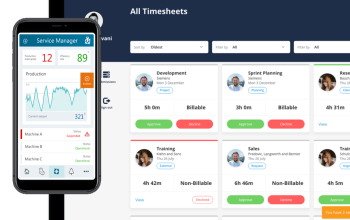Given how rapidly technology is revolutionizing our workspaces, it’s essential to stay abreast of the newest trends. To assist you with this task, we’ve compiled a list of the top 10 emerging technologies expected in 2023.
One of the most intriguing advances is breath-sensor technology, which can detect diseases by sampling concentrations of over 800 compounds in human breath. Breath sensors look for changes in electrical resistance as breath compounds flow over a metal-oxide semiconductor and then analyze this sensor data with algorithms.
1. Robot Journalism
Robot journalism, also referred to as automated news or algorithmic journalism, utilizes artificial intelligence (AI) and machine learning techniques for producing news articles. This enables real-time, on-the-spot news production from vast datasets.
Automated journalism works best for fact-based stories where clean, structured data is readily available. However, it cannot be effective when no data exists or the quality of that available data is questionable.
2. Artificial Intelligence
Artificial intelligence (AI) is a revolutionary new technology that is revolutionizing our lives. It powers smartphone personal assistants, navigation applications, ride-sharing apps and more – leaving us with more time to do the things we love.
AI systems can perceive environments, recognize objects, make decisions and learn from experience. They even mimic human behavior and patterns.
3. Machine Learning
Machine learning is the ability of computers to analyze data and make decisions autonomously. It utilizes neural networks and deep learning algorithms that enable computers to recognize patterns in large amounts of information without human programming.
Machine learning is being utilized in a range of industries, from fraud detection to product recommendations. It plays an integral role in medical imaging and diagnostics as well as self-driving cars.
4. Robotic Process Automation
Robotic process automation (RPA) is a software-based technology that enables businesses to automate repetitive tasks. Not only does RPA reduce costs and boost efficiency, but it’s an effective means for business growth as well.
These bots can execute a wide range of tasks, such as taking received forms, verifying them for completeness and filing them in a database. Furthermore, they help prevent costly errors and typos.
5. Green Technology
Businesses are investing in green technology to boost efficiency and cut operating expenses. They use smart technologies for tracking energy consumption, automating operations and optimizing resource use across their entire operations or supply chains.
Green technology can assist businesses and governments in combatting environmental problems like pollution, depleting natural resources and climate change. It may also open up new career paths and spur economic development.
6. Artificial Intelligence and Machine Learning
AI is an incredibly useful tool, enabling companies to rethink how they organize information, analyze data, and use the resulting insights for improved decision-making.
Machine learning, an application of AI, allows computers to learn from data without being programmed explicitly. This enables machines to execute tasks such as language translation, predictive text and Netflix recommendations automatically.
These systems are already powering self-driving cars, logistics services, virtual nursing assistants and personalized textbooks and tutors – with more use cases expected in the future.
7. Augmented Reality
Augmented reality (AR) is a technology that overlays a digital image over top of users’ perception of the real world, creating an illusionary layer between virtual and physical environments. As its use grows across industries, this concept will continue to blur the distinctions between them.
AR can be applied to a range of purposes, from education to entertainment. Kids learn better through interactive experiences than from paper-based books, and doctors and nurses could quickly identify certain types of wounds with AR technology.
8. Natural Language Processing
Natural language processing (NLP) is one of the most influential and rapidly developing fields in artificial intelligence. This field utilizes linguistic and statistical algorithms to interpret text, making it more useful for businesses.
The field of Natural Language Processing (NLP) began in the 1950s, when Alan Turing created the Turing test to assess computer intelligence. Nowadays, NLP is used across numerous industries to automate tasks and boost efficiency in business operations.
9. Space-Based IoT
The Internet of Things (IoT) is becoming a key player in the space industry as a novel way to provide connectivity to remote places where terrestrial networks do not yet exist. This capability will be especially advantageous when astronauts travel to places without internet access.
Many startups are developing space-based IoT systems to address this challenge. Their main objective is to build low-cost and lightweight satellites that can collect data from devices at a distance that cannot be accomplished using terrestrial networks.
10. 5G
5G is the next-generation of wireless networks, offering faster connection speeds and superior network performance. Thanks to its reduced latency, 5G technology can enable new services that will revolutionize industries.
5G technology can enable remote control of vehicles and medical procedures with its low latency links, as well as monitoring critical infrastructure like power plants.




